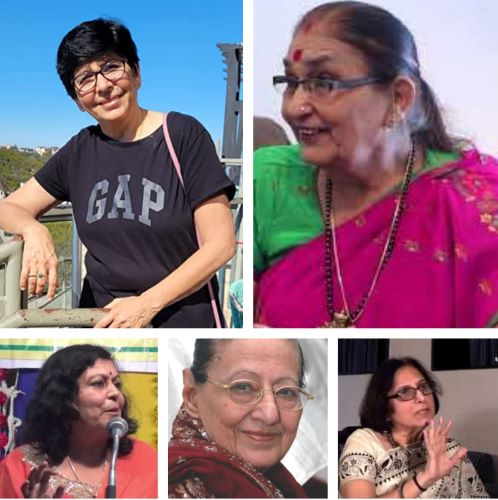
These women have not only paved the way for future generations of Sindhi writers but have also played a crucial role in preserving and promoting Sindhi culture and heritage
By Nasir Aijaz
Very recently, I had a 14-hour long telephonic conversation, 2-hours a day on an average, for a week, with Mr. Nari Lachhwani, an eminent poet and artist, based in Bairagarh (Renamed as Sant Hirdaram Nagar), Bhopal city of India’s Madhya Pradesh state. We talked about his life journey as a writer and artist, towering personalities in the field of Sindhi literature, he spent time with, past, present and future of Sindhi language in India, the female prose and poetry writers of Sindhi language, and many other topics. Having good memory, Lachhwani spoke in detail on Sindhi language and literature that passed through various phases since the partition of subcontinent in 1947, which resulted in displacement of Sindhis.
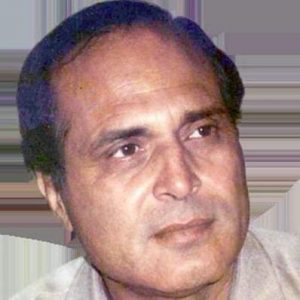
Nari Lachhwani, born on August 3, 1949 at Deoli Refugee Camp in Rajasthan, to Smt. Devi of Moro town of Sindh and Shri Thanwardas of Daulatpur, District Nawabshah, Sindh has written more than 200 poems. His poetry book “Khota Sikka Tao Bin” (A Dead Coin without You) was released in the year 2018. He served for 25 years at All India Radio as casual announcer/ compere in both Hindi and Sindhi languages. Lachhwani had been active in Stage Shows all over India performing singing, drama, and attending Kavi Sammelans since 1965 till date. He also visited Sindh for this purpose. He has performed in about 50 dramas and 3 Sindhi movies. His 3 song albums (Geet-Gazal) have also been released. He taught Sindhi language to non-Sindhi listeners through All India Radio’s various stations throughout the country for six months. He is still active in singing, acting, poetry and essay writing at the age of 74. He is former member of Sindhi Advisory Board of Sahitya Akademi, New Delhi.
I would like to share a segment of conversation solely related to the Sindh female writers and poets.
“Sindhis in India, although scattered across the country, were fortunate enough to have the towering women of letters in the past who contributed a lot enriching Sindhi language and literature. And even today, we can name many senior female writers, while more and more budding poetry and prose writers are coming up,” Mr. Nari Lachhwani said at the outset.
Female Sindhi writers of early post-partition era played a unique role quite different to any other time period
“The second half of 19th century and the first half of 20th century could be a very exciting time for Sindhi female writers, as the new era of Sindhi literature had dawned with introduction of modern printing techniques and facilities. Another important factor was that Sindhis had their own motherland where they lived as one nation. However, it was a very challenging time for them being uprooted in 1947,” he said and added, “They were multi-tasked – survival in a land, alien for them so far. Survival in the sense that they had to adjust in a new land, earn livelihood and also strive for keeping their language, culture and identity alive.”
“Female Sindhi writers of early post-partition era played a unique role quite different to any other time period. They not only produced literature including novels, short stories and poetry but also tackled issues concerning women that were considered controversial like feminism and outdated traditions,” he commented.
“As we have read, in Sindhi literature, the first bold lady writer, who wrote a novel ‘Itihad’ in which the Hindu heroine falls in love with a Muslim boy and marries him, despite all the opposition, was Guli Sadarangani, who paved the way for Sindhi female writers.”
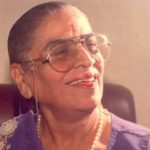
“However, Popati Hiranandani, a writer of pre and post-partition era is known for using her Boli (language) as a Goli (Bullet). She was a writer with the fighter’s spirit. We can sense the fighting spirit in her novels, stories, essays and poems. She came into full form after the partition of India. She revolted against the male dominated society, against male atrocities towards their women counterparts.”
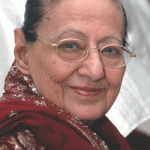
“Sundari Uttamchandani, another senior Sindhi writer’s style of ‘women’ in her stories is totally different. Most of her characters are emotional, mild, soft and delicate. Her language is poetic with original pure Sindhi accent. The background of her stories is urban, middle class Sindhi social circle. Some of her stories have progressive touch, depicting poverty, disease and despair. There is lot of variety of female characters in her stories, which deal with domestic issues,” Lachhwani said adding that Mohini Hingorani, based in New Delhi, is also among the prominent writers.
He continues speaking about the female Sindhi writers.
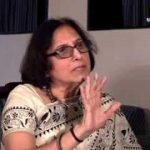
Another female writer is Tara Mirchandani. Her female characters are mild, loving, sweet, emotional and gullible. They love intensely and put all their trust and faith blindly in their lovers, who turn out to be fake lovers and scoundrels. Tara tells us about the cunningness and infidelity of men. Her heroines suffer a lot at the hands of their lovers, but they do not rebel. They suffer quietly and carry the burden of their grief alone.
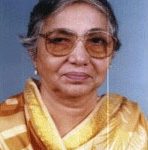
In Kala Prakash’s stories we find the women working in the offices of big metros of India. She tells us about the mental tensions and turmoil of working class women. How men make passes at them and demand something in return for the small favors bestowed on them.
Indira Vaswani has also touched the subject of life and problems of urban working women.
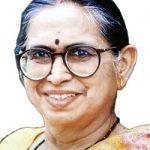
Rita Shahani has raised her voice and shown duplicity and disloyal nature of man in her stories. Her female characters revolt against injustice meted out to them by men. She has also touched the subject of most heinous and cruel crime committed by men in the shape of rape. She has shown weaknesses and follies of both the sexes in her stories.
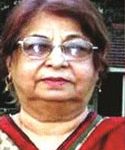
Maya Rahi, in her stories reveals women’s weakness, their benevolent nature of giving away all their earnings and savings to their menfolk unhesitatingly and in most cases being the losers in the end.
Dr. Yashodhara Wadhwani, has given vent to the feelings of anguish, despair and revolt of a woman’s heart by comparing her with Indian musical instruments, such as Bansuri (flute), Sarangi (a kind of harp) and Bheri (trumpet).
Yashodhra has also condemned the deplorable practice of female feticide where women themselves destroy their daughter before they are born, under the pressure of husbands, in-laws and society.
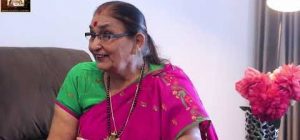
Indira Poonawala, Dr. Kamla Goklani and Veena Shringi have also depicted women suffering in their stories and poems.
“We can clearly see the change of tone in the expression of Sindhi women writer’s work. They no longer hesitate to express their sweet romantic thoughts and emotions nor do they try to curb the feelings of revolt, Nari Lachhwani stated.
Nari Lachhwani shared several names of female Sindhi writers and the cities they are based in India.
Tara Mirchandani, Ratna Gogya (Late) and Indra Shabnam (Poonawala) lived in Pune. Rita Shahani, granddaughter of Prof. Mangharam Malkani also lives there. Dr. Kamla Goklani, author of over two dozen books, is based in Ajmer. She is the first Sindhi woman who did her PhD on great Sindhi poet Narayan Shyam.
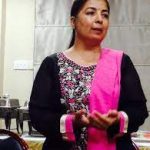
Another prominent name in Sindhi literature was Indra Haresh Vaswani, wife of Prof. Haresh Vaswani (Known as the founder of free verses in Sindhi). Indra Haresh was the winner of awards for her poetry and short stories. They lived in Gandhidam, Kutch, and have passed away.
Dr. Vimi Sadarangani, Assistant Professor, who worked for Rachna magazine, also lives in Gandhidam while Dr. Nirmala Asnani, a poet, is the Principal of a college in Bhavnagar – a college said to be the alma mater of Gandhi.
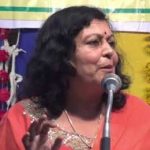
In Madhya Pradesh state, Indore city is also home to many Sindhi female writers. A prominent name among those is Dr. Nadia Masand (Utamchandani). She was born in Nasik, India but grew up and studied in Sindh where she did her masters in Urdu and PhD in Psychology. Dr. Nadia migrated to India in early 1990s. She is now doing masters in Sindhi. She is author of many books including ‘Maa, Manto Ain Nafsiyat’ published in 2020.
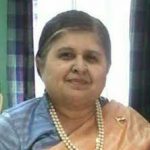
Rashmi Ramani, a poet and writer also hails from Indore while poet Shobha Lekhwani and Dropadhi Chandnani are based in Bhopal city of Madhya Pradesh. Dropadhi writes in Hindi and Sindhi. “Kiran Paryani Anmol, who studied in Sindh, is also Indore-based poetess. She was granted Indian citizenship very recently,” Nari Lachhwani told.
“I will specially mention one of the best female Sindhi writers – Jaya Jadwani of Raipur. Jaya is known as novelist more than a poet, as she has authored several books. Initially, she used to write in Hindi. Her novel ‘Mitha Pani, Khara Pani’, a prize-winner book, which later was translated into Sindhi by Dholan Rahi as ‘Mitho Pani, Kharo Pani’. She started writing in Sindhi after her popularity in Sindhi literary circles. “This novel is written in the background of Sindh,” he said.

Poetess Neelu Megh is also based in Raipur.
Coming to Ahmedabad, he named Daya Lalchandani, Meena Shahdadpuri, and Heena Agnani (All poetesses) and writer Tamana Lalwani (Roshni Rohra after the marriage), who is daughter of Jetho Lalwani. Another writer Suneeta Mohnani is announcer at Ahmedabad Radio.
Talking about Sindhi female writers of Adipur, he mentioned Bharti Sadarangani, a poetess, who is sister of another writer Vimi Sadarangani. “Three new poetesses and writers – Champa Chetnani, Komal Dayalani and Sangeeta Khilnani have also emerged on the horizon of Sindhi literature,” he told.
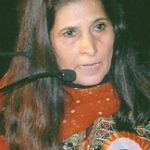
In Delhi, Veena Shringi is the known poetess and writer, author of several books including novels and travelogue, while her sister Shalini Sagar and Asha Ahuja (Her new name Rini Mir Raja) are also based in Delhi.
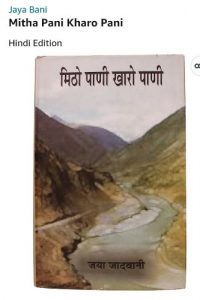
Ulhasnagar, the largest enclave of Sindhis, has also given birth to several writers and poetesses including Pirya Wachhani, Meena Sabhagani and Neeta Lalwani, both poetesses, while Prof. Dr. Sandhya Kundnani and Shobha Lalchandani are based in Mumbai.
Nari Lachhwani also shared more names, which are: Sarita Sharma (Thane), Veena Karamchandani (Jaipur), Meena Rupchandani (Ulhasnagar), Vinita Motlani (Indore), Harsha Moolchandani (Sant Hirdaram Nagar), Sunita Lulla (Hyderabad), Geeta Bindrani (Mumbai – daughter-in-law of M. Kamal), Shobha Chandnani (Mumbai – daughter of Gobind Malhi), Barkha Khushalani (Mumbai – daughter of Thakur and Paroo Chawla), Soni Moolchandani Bellani and Devi Nagrani, both from Mumbai (Sometimes in USA).
As our conversation was coming to end, Nari Lachhwani named Sameeksha Lachhwani, his daughter, who is also poet and short story writer. Sameeksha is Sindhi teacher at a local school in Bairagarh.
“Sindhi girls used to write also in English. One of them, Hardika Lalwani, daughter of Bairagarh-based friend Dileep Lalwani, is also an author. Having done masters in English, Hardika, 23-years of age, has authored two novels, of which one has been published in Canada and the other one is under the process,” Nari Lachhwani told.
Also Read: Woman in Sindhi Poetry
“The literary contributions of Sindhi female writers in India have been invaluable, enriching the Sindhi literary tradition with their unique perspectives and voices. These women have not only paved the way for future generations of Sindhi writers but have also played a crucial role in preserving and promoting Sindhi culture and heritage,” he said.
“While the contributions of male writers have often been celebrated, it is equally important to recognize the significant role played by Sindhi female writers in shaping the literary landscape of India,” Nari Lachhwani concluded apologizing if he had forgotten to mention any other Sindhi female writer.
Also Read: Sindhi Women in the field of Literature
_________________
Nasir Aijaz is a senior journalist based in Karachi, Sindh. He is author of nine books and scores of articles on literature, history, language and other subjects.
Very nice. Congratulations on your special efforts on this compilation. Request please also search for others talents such as my my postage stamps collection hobby. Self a multiple world records holder in philately and social service.
Records in Guinness, Limca, India Book Of Records maharashtra Book Of Records, Assam Book Of Records, World book of records, London, UK, Golden Book of records etc list is long.
Excellent. Renowned female sindhi writers. Salute to all of them and others too who are writing well but not included in it.
[…] I owe thanks to renowned poet and artist Mr. Nari Lachhwani of Hirdaram Nagar, Madhya Pradesh who helped me to contact Mr. Nand Bindrani, who shared website […]